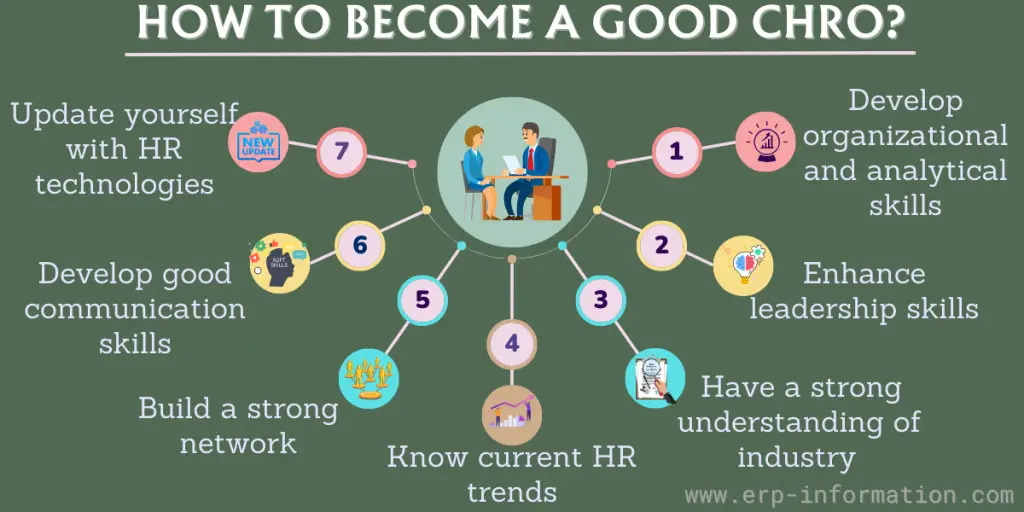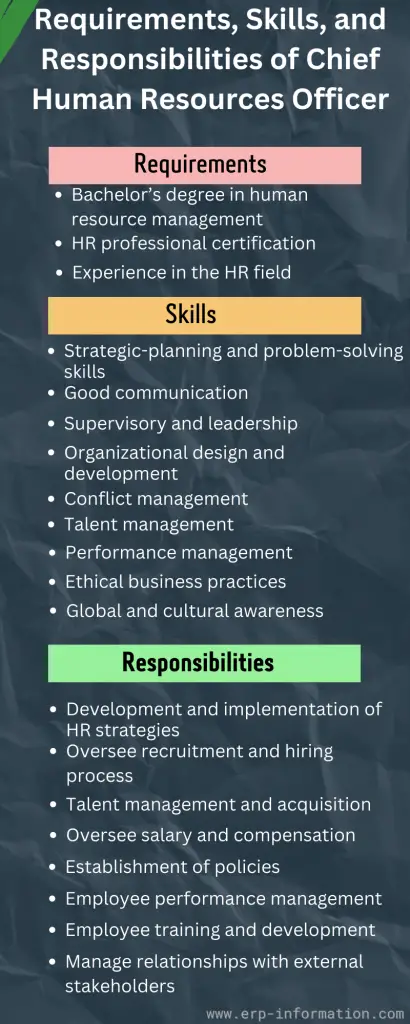The Chief Human Resources Officer (CHRO) plays a critical role in any organization as they lead the strategy and execution of human resources initiatives.
But finding the right person to fill this role can be challenging. You need someone with the right qualifications and experience to lead your HR team in an ever-changing business environment.
This blog post will discuss the responsibilities of a Chief Human Resources Officer, their qualifications and skillset, and how to become a good CHRO.
What is a Chief Human Resources Officer (CHRO)?
The Chief Human Resources Officer (CHRO) is a senior-level executive position responsible for providing strategic direction, leadership, and management of the organization’s human resources function.
The CHRO leads a team to develop and implement comprehensive HR policies and strategies that ensure the company is legally compliant with labor laws while maintaining a positive working environment with engaged employees.
They are responsible for recruiting, employee relations, training, benefits and compensation, performance management, and talent planning.
By working closely with other departments in the organization, the CHRO helps ensure that individual goals align with corporate objectives.
They ensure that the company has access to the right talent, processes, and tools to succeed in an increasingly competitive business environment. The CHRO is also called the chief officer of people or vice president of human resources.
Roles and Responsibilities of CHRO
Develop, implement, and evaluate human resource strategies
The chief human resources officer (CHRO) is responsible for developing, implementing, and evaluating the overall HR strategies of an organization.
That involves understanding the organization’s mission, goals, and objectives and determining how best to support them through effective HR practices.
Lead in developing a culture that fosters an appreciation for diversity
The CHRO must also lead in developing a culture of inclusion and appreciation for diversity. That involves creating initiatives that promote equity, respect, and understanding between employees of all backgrounds.
Oversee recruitment, selection, and hiring processes for new employees
The CHRO is also responsible for overseeing new employees’ recruitment, selection, and hiring process. That includes designing job descriptions, conducting interviews, and making hiring decisions.
Establish policies and procedures to ensure compliance with labor laws and regulations
The CHRO must also establish HR policies and procedures that ensure compliance with local, state, and federal labor laws. These policies should be regularly reviewed and updated to remain up-to-date on any changes in the law.
Look after salary and compensation structure.
The CHRO is responsible for ensuring the organization’s salary and compensation structure is fair and competitive. They should also ensure that salaries are benchmarked against the market to ensure employees are paid a fair wage.
Monitor employee performance, conduct regular reviews, and provide feedback on improvement areas.
The CHRO is responsible for monitoring employee performance and conducting periodic reviews. That helps to identify any areas for improvement, as well as recognize employees who are excelling in their roles.
Implement training programs to enhance employee skillsets
Another responsibility of the CHRO is to create and implement training programs that help employees develop new skills. That helps to ensure that employees are kept up-to-date on current trends and have the knowledge needed to succeed in their roles.
Manage relationships with external stakeholders such as unions or government agencies
Lastly, the CHRO must manage relationships with external stakeholders such as unions or government agencies. That involves staying up-to-date on collective bargaining agreements and working with these entities to ensure compliance.
Skills of CHRO
A successful Chief Human Resources Officer (CHRO) must have many skills and competencies.
That includes
- Excellent strategic planning and problem-solving capabilities
- Supervisory and leadership skills
- Strong communication skills
- A deep understanding of employment laws, regulations, and compliance requirements
- Resolving conflicts between departments or employees
- Quickly identifying talent needs for the company
- Creating effective recruitment strategies.
Let us see them one by one in detail.
Strategic planning and problem-solving capabilities
Chief human resources officers must have the ability to develop long-term strategies and solutions to any current or potential issues that may arise in the workplace.
Conflict resolution
This skill set is essential when resolving employee disputes, negotiating labor contracts, and developing policies that employees and employers can agree on.
Supervisory and leadership
Chief human resources officers need to have the ability to lead by example and be able to motivate and manage staff effectively.
Good communication
Having great communication skills is essential for chief human resources officers to interact with all levels of the organization, manage relationships with stakeholders, and understand the needs of both their employers and employees.
Organizational design & development
This skill includes the ability to create systems and policies that are sustainable, effective, and efficient.
Talent management & acquisition
Chief human resources officers need to be able to source, recruit, and retain talented staff for their organization.
Performance management
A chief human resources officer needs to be able to monitor performance levels, efficiently manage appraisals, and ensure that all employees are working towards the same goals.
Ethical business practice
Chief human resources officers must be well-versed in ethical business practices and ensure that all employees are treated fairly and ethically.
Global and cultural awareness
They should have good global and cultural awareness. That includes managing a diverse and multicultural workforce and understanding how global trends may affect their organization.
Requirements of CHRO
The chief human resources officer must be highly qualified to fulfill these responsibilities effectively.
That typically includes at least a bachelor’s degree or masters in human resource management or a related field and several years of experience in human resources management.
Additionally, chief human resources officers often obtain professional certification from organizations such as the Society for Human Resource Management (SHRM) or the Human Resources Certification Institute (HRCI).
By demonstrating their expertise and credentials, chief human resources officers can ensure they can effectively lead their organizations in the ever-changing landscape of human resources management.
Significance of CHRO
The Chief Human Resources Officer (CHRO) holds a critical position within the executive team, playing a vital role in guiding the company towards success.
Here are key reasons highlighting the exceptional importance of the CHRO
Custodian of talent
The CHRO is the guardian of the company’s most precious asset—the workforce. They focus on attracting, retaining, and nurturing top talent, recognizing that employees are the driving force behind the company’s success.
Strategic business partner
Beyond HR functions, the CHRO actively contributes to the company’s overall business objectives. By aligning HR strategies with the larger business strategy, they act as a catalyst for enhancing performance, profitability, and overall growth.
Compliance navigator
Navigating the complexities of employment laws and regulations falls under the CHRO’s purview. Ensuring the company’s adherence to these regulations is crucial for avoiding legal issues and maintaining a clean compliance record.
Architect of a positive work culture
The CHRO is instrumental in creating and sustaining a harmonious, productive work environment. Recognizing the pivotal role of a positive atmosphere in employee morale and productivity, the CHRO focuses on developing and enforcing HR policies that exemplify fairness, equity, and respect.
How to Become a Good CHRO?

To become a good CHRO, you should focus on developing organizational, analytical, and leadership skills.
In addition to your educational background, a strong understanding of the industry you work in and an up-to-date knowledge of current HR trends will help you stay competitive.
Additionally, building strong relationships with other departments within the organization will help you build trust with staff and senior management.
Developing good communication and mediation skills can also be key resources for conflict resolution or dealing with difficult conversations between staff members or management.
Finally, staying abreast of new HR technologies and processes is important as they evolve rapidly in today’s business environment.
Steps to Become CHRO
- Earn a Bachelor’s Degree in Human Resources, Business Administration, or a related field.
- Gain experience in Human Resources, preferably 5-10 years of progressive managerial experience.
- Consider obtaining professional certifications such as SPHR, SHRM, and PHR.
- Identify organizations hiring a CHRO and apply for the positions that fit your skill set. 5. Participate in job interviews to highlight your knowledge and experience within HR departments.
- Develop relationships within the organization you are applying to by networking with other department heads and senior management
- Continue to take courses to keep up with best practices in Human Resources management to stay competitive in the field.
- Once hired for the position of CHRO, work on developing short-term and long-term strategies for improvement within their respective HR department.
FAQs
What is the salary range of CHRO?
The salary range of a Chief Human Resources Officer (CHRO) varies depending on the size and industry of the organization they work in. Generally, CHROs earn an average annual salary of $115,000 – $175,000 US dollars. The lowest 10 percent earned less than $79,400, and the highest 10 percent earned more than $230,200 annually, according to the U.S. Bureau of Labor Statistics (2018).
According to Salary.com, the expected salary is from $241,788 to $435,812 per year. Therefore, the average salary per year will be $328,477.
What is the carrier path of CHRO?
The career path of a Chief Human Resources Officer (CHRO) typically begins after earning a bachelor’s degree in Human Resources, Business Administration, or an equivalent field. Most CHROs have at least five to ten years of HR experience before moving into the position of CHRO.
The most common way for individuals to move into a CHRO position is by taking on more responsibility within the HR department and working their way up from an HR assistant role to the HR manager, then to the HR director, and ultimately, CHRO. Along the way, many pursue additional certifications such as SPHR, SHRM, and PHR, which may help open up new job opportunities.
What is the role of CHRO in an organization, and how has it evolved in recent years?
The CHRO’s role goes beyond traditional HR tasks. They are strategic leaders who shape company culture, develop talent, and align HR with business goals. In recent years, the CHRO role has evolved to focus on data-driven decision-making and fostering inclusivity in the workplace.
What challenges do CHROs face in managing a diverse workforce, and how can they address them effectively?
CHROs must handle challenges like remote work management, work-life balance, and ensuring equity in a diverse workforce. Solutions include utilizing HR technology for remote work, implementing flexible policies, and implementing comprehensive diversity and inclusion programs.
How does technology impact the role of a CHRO in modern organizations?
Technology empowers CHROs with data-driven insights for informed decision-making. HR software automates routine tasks, enabling HR teams to focus on strategic initiatives. Data analytics helps in workforce planning, talent acquisition, and employee engagement.
What future trends and challenges will CHROs likely face in human resource management?
Future challenges include adapting to AI and automation, managing a remote workforce, and addressing mental health in the workplace. CHROs must stay agile, prioritize employee well-being, and champion technological innovation to meet these challenges head-on.
Conclusion
Ultimately, the chief human resources officer ensures that an organization’s HR practices are effective and compliant with applicable laws and regulations.
Therefore, the CHRO must thoroughly understand labor laws and regulations and have a strong knowledge of HR best practices.
In addition, this role requires strong leadership and communication skills and the ability to think strategically. By leveraging these qualifications, the CHRO can ensure that their organization’s HR strategies remain effective and compliant.

